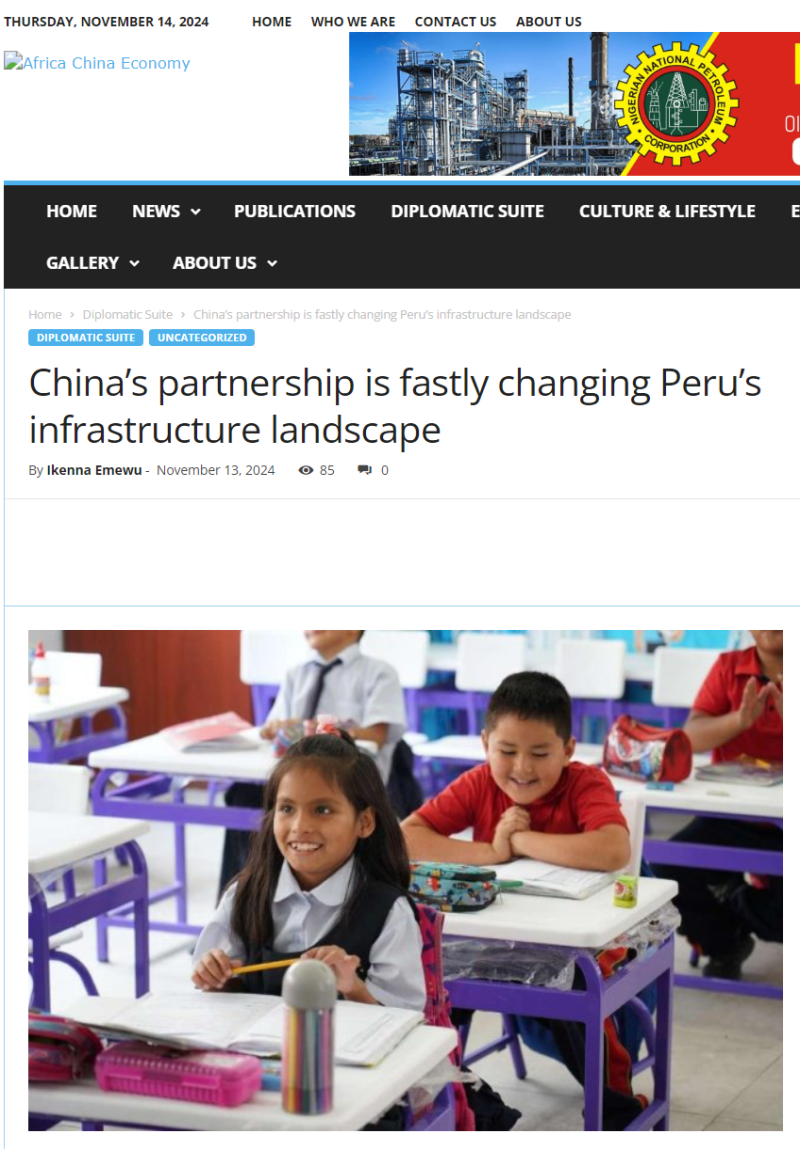China’s partnership is fastly changing Peru’s infrastructure landscape
About 80 kilometers north of Lima, capital of Peru, the Chancay Port jointly undertaken by China Harbour Engineering Company and the Fourth Harbor Engineering Co., Ltd. under China Communications Construction Company is under construction.
Blue quay cranes stand in neat rows at the construction site, busily performing their tasks. Over 20 autonomous transport vehicles are seamlessly moving newly arrived containers to the storage yard.
Since the first phase of the project began construction in 2021, “From Chancay to Shanghai” has become a catchphrase in Peru. As the project is near completion, this vision is becoming a reality.
Upon completion, the port will serve as a new land-sea route between China and Latin America, leading to a notable reduction in shipping time. It will also link to the Pan-American Highway through tunnels, providing direct access to Lima and significantly facilitating trade and regional connectivity.
José Arista Arbildo, Peru’s minister of economy and finance, said that the Chancay Port, as a landmark project of Peru-China cooperation, will substantially reduce logistics costs, enhance competitiveness and open up market opportunities for Peruvian products, making Peru a regional logistics hub.
There is a broad scope for Peru-China cooperation, and the Peruvian government is committed to promoting practical cooperation between the two sides in more areas, the minister said.
Under the framework of high-quality Belt and Road cooperation, Chinese companies have made significant contributions to Peru’s infrastructure development, bringing tangible benefits to local people.
For instance, a school in Peru’s La Libertad region has developed spacious, well-lit classrooms and playgrounds equipped with necessary facilities for students. Just a few years ago, the situation was entirely different.
In 2017, the area was hit by severe flooding, causing considerable water damage to the school, leading to extensive wall cracks, and presenting serious safety threats to the old buildings.
To address this situation, Peru’s National Infrastructure Authority allocated funds for the school’s reconstruction, which was undertaken by Yellow River Co., Ltd. under Power Construction Corporation of China (PowerChina).
The new campus, which was officially delivered in August this year, covers approximately 4,500 square meters, with a total building area of 4,000 square meters. Divided into kindergarten and primary school sections, the renovated school can accommodate over 1,000 students. It includes bright classrooms, administrative offices, a library, computer rooms, science labs, as well as basketball courts, a kitchen, and a dining hall.
“The well-designed new campus is equipped with complete facilities, creating a safe and modern learning environment that is highly regarded by students and parents,” said the principal of the school.
The principal expressed deep gratitude for the involvement of the Chinese company in the school’s reconstruction, believing it not only benefited the students but also supported the educational development of the region.
“We hope that Peru and China continue deepening cooperation so as to bring us more benefits,” the principal added.
About the author:
Ikenna Emewu, Editor-in-chief, Africa China Economy Magazine, Nigeria. This article was culled from Africa China Economy Magazine, Nov.13, 2024.



